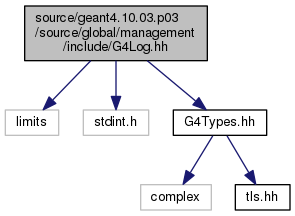#include <limits>
#include <stdint.h>
#include "G4Types.hh"
Go to the source code of this file.
|
| G4double | G4LogConsts::get_log_px (const G4double x) |
| |
| G4double | G4LogConsts::get_log_qx (const G4double x) |
| |
| uint64_t | G4LogConsts::dp2uint64 (G4double x) |
| |
| G4double | G4LogConsts::uint642dp (uint64_t ll) |
| |
| G4float | G4LogConsts::uint322sp (G4int x) |
| |
| uint32_t | G4LogConsts::sp2uint32 (G4float x) |
| |
| G4double | G4LogConsts::getMantExponent (const G4double x, G4double &fe) |
| | Like frexp but vectorising and the exponent is a double. More...
|
| |
| G4float | G4LogConsts::getMantExponentf (const G4float x, G4float &fe) |
| | Like frexp but vectorising and the exponent is a float. More...
|
| |
| G4double | G4Log (G4double x) |
| |
| G4float | G4LogConsts::get_log_poly (const G4float x) |
| |
| G4float | G4Logf (G4float x) |
| |
| void | logv (const uint32_t size, G4double const *__restrict__ iarray, G4double *__restrict__ oarray) |
| |
| void | G4Logv (const uint32_t size, G4double const *__restrict__ iarray, G4double *__restrict__ oarray) |
| |
| void | logfv (const uint32_t size, G4float const *__restrict__ iarray, G4float *__restrict__ oarray) |
| |
| void | G4Logfv (const uint32_t size, G4float const *__restrict__ iarray, G4float *__restrict__ oarray) |
| |
Definition at line 230 of file G4Log.hh.
254 res -= fe * 2.121944400546905827679e-4;
258 res += fe * 0.693359375;
261 res = std::numeric_limits<G4double>::infinity();
263 res = - std::numeric_limits<G4double>::quiet_NaN();
G4double get_log_qx(const G4double x)
G4double getMantExponent(const G4double x, G4double &fe)
Like frexp but vectorising and the exponent is a double.
G4double get_log_px(const G4double x)
const G4double LOG_LOWER_LIMIT
const G4double LOG_UPPER_LIMIT
Definition at line 311 of file G4Log.hh.
326 res += -2.12194440e-4f *
fe;
331 res += 0.693359375f *
fe;
334 res = std::numeric_limits<G4float>::infinity();
336 res = -std::numeric_limits<G4float>::quiet_NaN();
G4float getMantExponentf(const G4float x, G4float &fe)
Like frexp but vectorising and the exponent is a float.
const G4float LOGF_UPPER_LIMIT
const G4float LOGF_LOWER_LIMIT
G4float get_log_poly(const G4float x)
| void G4Logfv |
( |
const uint32_t |
size, |
|
|
G4float const *__restrict__ |
iarray, |
|
|
G4float *__restrict__ |
oarray |
|
) |
| |
| void G4Logv |
( |
const uint32_t |
size, |
|
|
G4double const *__restrict__ |
iarray, |
|
|
G4double *__restrict__ |
oarray |
|
) |
| |
| void logfv |
( |
const uint32_t |
size, |
|
|
G4float const *__restrict__ |
iarray, |
|
|
G4float *__restrict__ |
oarray |
|
) |
| |
| void logv |
( |
const uint32_t |
size, |
|
|
G4double const *__restrict__ |
iarray, |
|
|
G4double *__restrict__ |
oarray |
|
) |
| |



